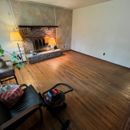One wall from 1974
I’m the homeowner who is renovating this second home for another family member and is currently unoccupied by humans – there is a cat and turtle living there now in IECC Building Zone 4, Ocean County New Jersey and trying to figure out what, if anything I should do to modernize an exterior 15″wide x 8″ section of wall cavity I had to open in the living room to mitigate a now under control termite infestation. Wall in question is the one in the picture with the fireplace.
Details:
-1974 construction ranch
-roof was replaced in 2016 with full GAF product and their top tier sheathing membrane
-2×4 studs with plywood sheathing, felt paper and can see day-light through sheathing edges. -original asbestos siding.
Old batts showed the telltale “lines” of air infiltration from the from those sheathing seams.
-Fireplace won’t be actively used and will instead be converted to an electric powered insert. It is not capped, flue is closed.
– leaky doors and everything else
– Window AC units are installed seasonally
– 1974 muli-zoned electric baseboard heat
I’ve read various DIY methods ranging from cut-n-cobble, flash-n-batt, fluffy unfaced + MemBrain on warm side, etc., but am not sure whether or not anything other than just filling with fluffy stuff like Rockwool would be a waste of time for one wall and not really provide noticeable comfort or efficiency results since it’s only one wall and the rest of the house has zero modernization when it comes to air sealing or “Green Building”, you know, because it was built in 1974 and other than the roof, is effectively still a 1974 house.
Windows are all wood framed single-panel with glass slide down storm panes.
I need to get the wall buttoned up before the fall or sooner so we leak less AC and heat out through the sheathing in this room.
I realize that probably the most bang for the buck would be to apply as much air sealing techniques as possible from the attic down and up from the crawl (on sand), and when/if the siding ever gets replaced, have modern house wrap applied, foam, etc.
So, what would you fill these wall cavities with and would any method have quantifiable results that would be any different from the paper-faced R19 fluff that was previously in there?
GBA Detail Library
A collection of one thousand construction details organized by climate and house part










Replies